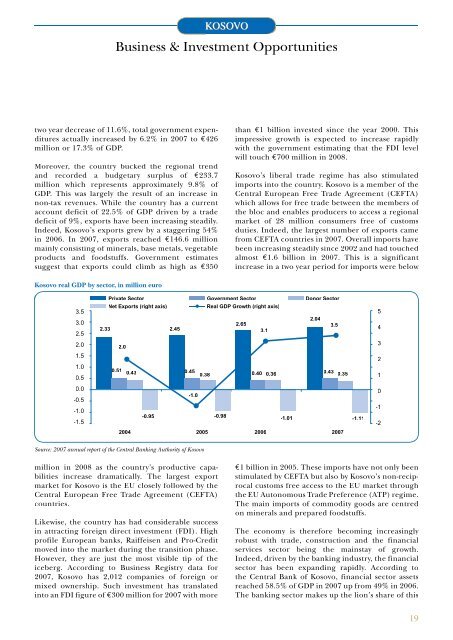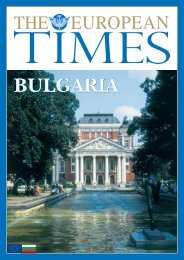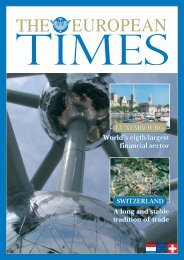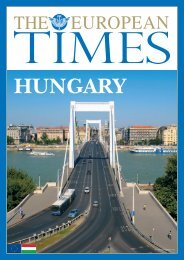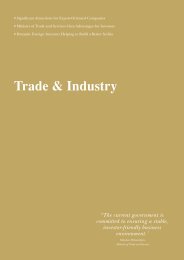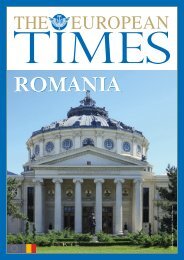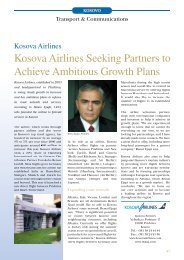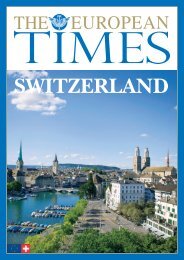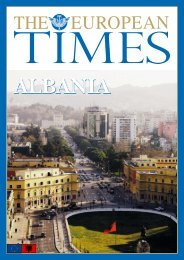Download Kosovo Report - The European Times
Download Kosovo Report - The European Times
Download Kosovo Report - The European Times
You also want an ePaper? Increase the reach of your titles
YUMPU automatically turns print PDFs into web optimized ePapers that Google loves.
KOSOVO<br />
Business & Investment Opportunities<br />
two year decrease of 11.6%, total government expenditures<br />
actually increased by 6.2% in 2007 to €426<br />
million or 17.3% of GDP.<br />
Moreover, the country bucked the regional trend<br />
and recorded a budgetary surplus of €233.7<br />
million which represents approximately 9.8% of<br />
GDP. This was largely the result of an increase in<br />
non-tax revenues. While the country has a current<br />
account deficit of 22.5% of GDP driven by a trade<br />
deficit of 9%, exports have been increasing steadily.<br />
Indeed, <strong>Kosovo</strong>’s exports grew by a staggering 54%<br />
in 2006. In 2007, exports reached €146.6 million<br />
mainly consisting of minerals, base metals, vegetable<br />
products and foodstuffs. Government estimates<br />
suggest that exports could climb as high as €350<br />
than €1 billion invested since the year 2000. This<br />
impressive growth is expected to increase rapidly<br />
with the government estimating that the FDI level<br />
will touch €700 million in 2008.<br />
<strong>Kosovo</strong>’s liberal trade regime has also stimulated<br />
imports into the country. <strong>Kosovo</strong> is a member of the<br />
Central <strong>European</strong> Free Trade Agreement (CEFTA)<br />
which allows for free trade between the members of<br />
the bloc and enables producers to access a regional<br />
market of 28 million consumers free of customs<br />
duties. Indeed, the largest number of exports came<br />
from CEFTA countries in 2007. Overall imports have<br />
been increasing steadily since 2002 and had touched<br />
almost €1.6 billion in 2007. This is a significant<br />
increase in a two year period for imports were below<br />
<strong>Kosovo</strong> real GDP by sector, in million euro<br />
Private Sector<br />
Government Sector<br />
Donor Sector<br />
3.5<br />
3.0<br />
2.5<br />
-<br />
-<br />
-<br />
2.33<br />
Net Exports (right axis)<br />
2.45<br />
Real GDP Growth (right axis)<br />
2.65<br />
3.1<br />
2.04<br />
3.5<br />
-<br />
-<br />
-<br />
5<br />
4<br />
2.0<br />
-<br />
2.0<br />
-<br />
3<br />
1.5<br />
1.0<br />
0.5<br />
-<br />
-<br />
-<br />
0.51 0.43<br />
0.45<br />
0.38<br />
0.40 0.36<br />
0.43<br />
0.35<br />
-<br />
-<br />
-<br />
2<br />
1<br />
0.0<br />
-0.5<br />
-1.0<br />
-1.5<br />
-<br />
-<br />
-<br />
-<br />
-0.95<br />
-1.0<br />
-0.98<br />
-1.01<br />
-1.11<br />
- 0<br />
-<br />
-1<br />
-<br />
- -2<br />
2004 2005 2006 2007<br />
Source: 2007 annual report of the Central Banking Authority of <strong>Kosovo</strong><br />
million in 2008 as the country’s productive capabilities<br />
increase dramatically. <strong>The</strong> largest export<br />
market for <strong>Kosovo</strong> is the EU closely followed by the<br />
Central <strong>European</strong> Free Trade Agreement (CEFTA)<br />
countries.<br />
Likewise, the country has had considerable success<br />
in attracting foreign direct investment (FDI). High<br />
profile <strong>European</strong> banks, Raiffeisen and Pro-Credit<br />
moved into the market during the transition phase.<br />
However, they are just the most visible tip of the<br />
iceberg. According to Business Registry data for<br />
2007, <strong>Kosovo</strong> has 2,012 companies of foreign or<br />
mixed ownership. Such investment has translated<br />
into an FDI figure of €300 million for 2007 with more<br />
€1 billion in 2005. <strong>The</strong>se imports have not only been<br />
stimulated by CEFTA but also by <strong>Kosovo</strong>’s non-reciprocal<br />
customs free access to the EU market through<br />
the EU Autonomous Trade Preference (ATP) regime.<br />
<strong>The</strong> main imports of commodity goods are centred<br />
on minerals and prepared foodstuffs.<br />
<strong>The</strong> economy is therefore becoming increasingly<br />
robust with trade, construction and the financial<br />
services sector being the mainstay of growth.<br />
Indeed, driven by the banking industry, the financial<br />
sector has been expanding rapidly. According to<br />
the Central Bank of <strong>Kosovo</strong>, financial sector assets<br />
reached 58.5% of GDP in 2007 up from 49% in 2006.<br />
<strong>The</strong> banking sector makes up the lion’s share of this<br />
19


